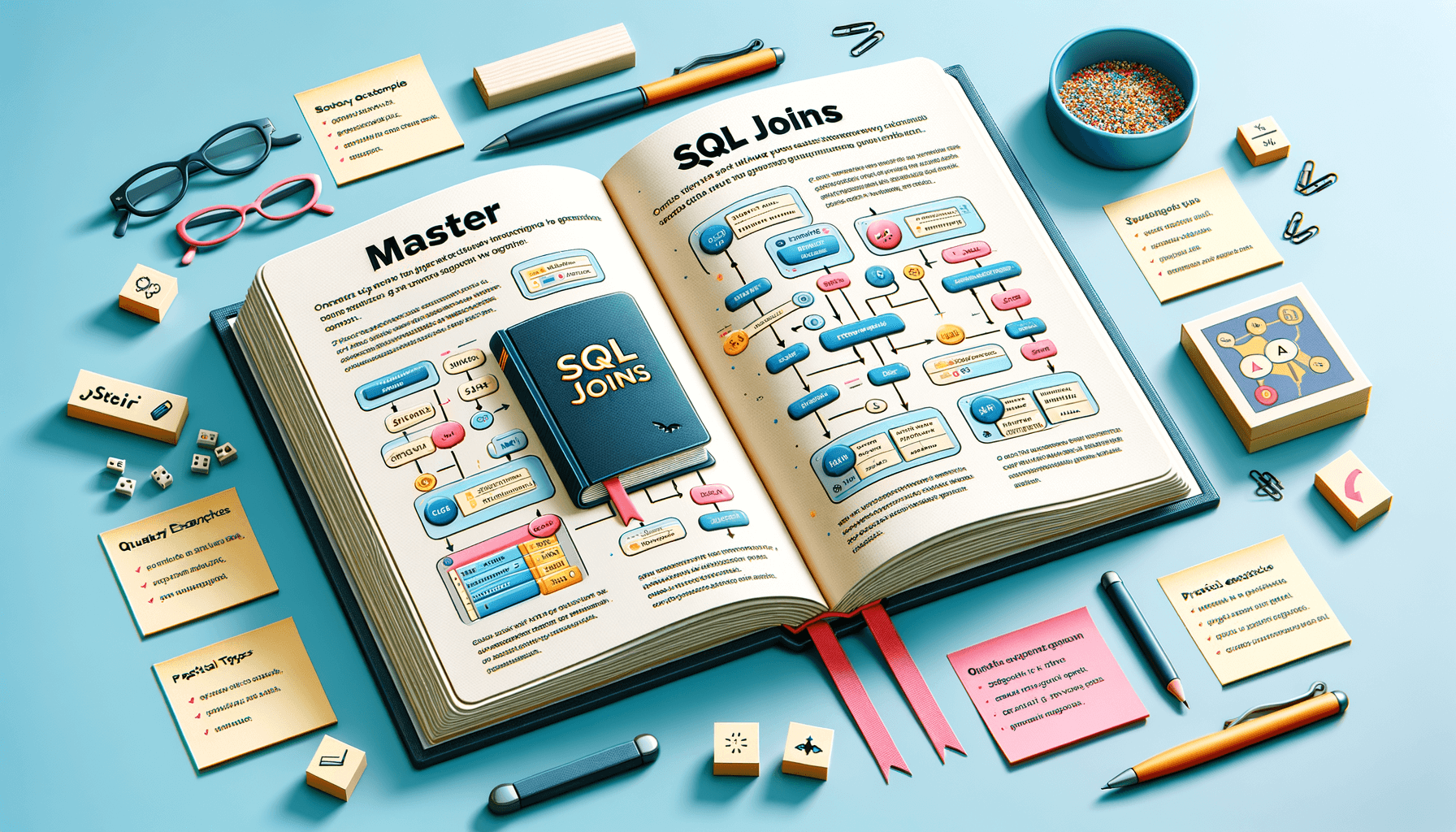A big variety of articles and resources

Navigating Data: Master Agency-Level SQL Techniques
 Sia Author and Instructor
Learn SQL
Sia Author and Instructor
Learn SQL
10 minute read
SQL Query Crafting
Essential SQL Queries
Mastering the basics of SQL is crucial for any data analyst. Writing essential SQL queries effectively is the first step towards leveraging the full potential of data manipulation and retrieval. This includes understanding how to select, insert, update, and delete data from a database.
Complex Query Mastery
To handle more sophisticated data scenarios, one must delve into complex SQL queries. These queries often involve multiple tables and conditions, requiring a deeper understanding of SQL syntax and logic. Mastering these queries can significantly enhance your data analysis capabilities.
Data Type Utilization
Utilizing the correct data types is essential for optimizing query performance and ensuring data integrity. Knowing when to use different data types such as integers, strings, or dates can prevent common errors and improve the efficiency of your SQL operations.
Advanced Reporting Skills
Improving Data Retrieval
To enhance data retrieval processes, it's crucial to understand the specific needs of your reports and tailor your SQL queries accordingly. Efficient data retrieval not only speeds up the reporting process but also ensures that the data is relevant and actionable. Optimizing your SQL queries for performance can significantly reduce the time it takes to fetch data, making your reports more timely and useful.
Enhanced Report Generation
Generating detailed and informative reports requires a deep understanding of both the data at hand and the tools available within SQL. Utilizing advanced SQL features such as subqueries, CTEs, and window functions can transform raw data into insightful reports. Emphasize the importance of layout and structure in your reports to make them easily digestible for stakeholders.
SQL Query Optimization
Efficient SQL query optimization involves understanding the intricacies of query execution and indexing. A well-optimized query not only runs faster but also consumes less resources, which is crucial in large-scale data environments. Techniques such as indexing, proper use of joins, and avoiding common pitfalls like N+1 queries should be part of every analyst's toolkit. Blockquote: > Remember, the goal of optimization is to reduce both the execution time and the load on the database server.
Data-Driven Decision Making
Driving Insights
In today's data-centric world, the ability to extract and interpret insights from data is crucial. Effective data analysis not only supports decision-making but also propels businesses towards innovative solutions and practices.
Supporting Business Decisions
Accurate data analysis underpins every successful business decision. By harnessing the power of SQL and other analytical tools, professionals can ensure that their decisions are well-informed and data-driven, leading to sustainable growth and competitive advantage.
Accuracy in Data Analysis
Ensuring accuracy in data analysis is paramount. This involves meticulous data preparation, validation, and the use of advanced analytical techniques to derive reliable and actionable insights. A focus on accuracy helps in minimizing errors and enhancing the credibility of the analysis.
Career Advancement
Developing In-Demand Skills
In today's data-driven world, mastering SQL is not just a technical necessity but a strategic advantage. By focusing on essential SQL techniques, you can significantly enhance your analytical capabilities, making you a valuable asset in any data-centric role. This skill set is particularly crucial for roles in data analysis and marketing where insights drive business strategies.
Elevating Career Opportunities
The ability to manipulate and interpret data can open doors to higher-level positions and specialized roles. Proficiency in SQL allows you to stand out in the job market, especially in industries that rely heavily on data for operational and strategic decisions. A solid foundation in SQL paired with real-world application experience can significantly boost your career trajectory.
Skill Application in Marketing
SQL skills are increasingly becoming a staple in the marketing sector. By enabling precise segmentation and targeting, SQL helps in crafting more effective marketing campaigns. The use of SQL in analyzing customer data ensures that marketing strategies are not only creative but also data-backed and results-oriented. This integration of SQL in marketing practices not only enhances campaign effectiveness but also demonstrates the direct impact of data skills on business outcomes.
Real-World Application
Everyday Analytical Challenges
In the fast-paced world of data analysis, professionals face everyday analytical challenges that test their ability to adapt and solve problems efficiently. Engaging with real-world data sets prepares analysts for the unpredictable nature of data and enhances their problem-solving skills.
AI-Assisted Exercises
AI-assisted exercises offer a unique opportunity for data analysts to leverage cutting-edge technology in their workflow. These exercises simulate complex data scenarios, allowing analysts to practice and refine their skills in a controlled, yet challenging environment.
Practical Quizzes
Practical quizzes are designed to test the knowledge and skills of analysts in a hands-on manner. These quizzes often involve real data and require the application of SQL techniques to derive meaningful insights, ensuring that the learning process is both effective and directly applicable to real-world tasks.
SQL Data Manipulation Tools
SQL Grouping Techniques
Mastering SQL grouping techniques allows for efficient data aggregation, which is crucial for generating meaningful insights from large datasets. By grouping data, analysts can perform aggregate calculations such as sums, averages, and counts, which are essential for summary reports and decision-making processes.
Mastering the HAVING Clause
The HAVING clause is a powerful tool for filtering grouped data that meets specific conditions. Unlike the WHERE clause, which filters rows before grouping, the HAVING clause filters after grouping, making it indispensable for complex data analysis.
Applying Numeric Filters
Applying numeric filters effectively can drastically enhance the performance of SQL queries. Numeric filters help in narrowing down the data under analysis, which can lead to quicker query results and more focused insights. This technique is particularly useful in scenarios involving large volumes of numerical data.
Blockquote: Understanding and utilizing these tools not only improves the efficiency of data manipulation but also enhances the overall quality of data analysis.
SQL Functions and Techniques
Advanced SQL Functions
Mastering advanced SQL functions is crucial for handling complex data scenarios efficiently. Learn to use functions like COUNT, DISTINCT, and ROUND to extract more meaningful insights from your data. These skills are essential for enhancing business intelligence and making data-driven decisions more impactful.
Sorting Techniques
Effective sorting techniques can significantly improve the readability and utility of your data. Understanding how to implement ORDER BY and using conditional sorting can help you present data in a more organized manner, making analysis simpler and more intuitive.
Enhancing Business Intelligence
By integrating advanced SQL functions and sorting methods, you can greatly enhance your organization's business intelligence capabilities. This not only speeds up data processing but also ensures that the insights derived are accurate and actionable. Applying these techniques effectively is key to maintaining a competitive edge in business intelligence.
SQL Joins Explained
Managing Database Relationships
SQL joins are fundamental in managing database relationships effectively. By using INNER JOIN, Left Join, and Right Join, you can merge rows from two or more tables based on a related column between them. This technique is essential for maintaining comprehensive and coherent data sets across your database systems.
Optimizing Database Performance
Optimizing query performance through efficient SQL joins can significantly enhance your database's responsiveness. Mastering joins not only improves data retrieval speed but also reduces the load on your database, ensuring smoother operations and better resource management.
Ensuring Data Integrity
Maintaining data integrity is crucial in any database management system. SQL joins help ensure that data remains accurate and consistent across different tables. Learning to implement joins correctly is vital for preventing data anomalies and ensuring reliable data for decision-making processes.
SQL joins play a pivotal role in both day-to-day operations and long-term data management strategies.
Data Analyst Introduction to SQL
Foundational SQL Skills
Master the basics of SQL to kickstart your journey in data analysis. This section covers the essential skills needed to query and analyze data effectively, providing a solid foundation for more advanced studies.
Querying and Analyzing Data
Learn to navigate complex datasets with ease. This segment focuses on enhancing your ability to extract meaningful insights from data, crucial for making informed decisions in any business context.
Real-World Data Analysis Context
Apply your SQL knowledge in real-world scenarios. This part of the course emphasizes practical application, ensuring you can handle actual data analysis tasks confidently and proficiently.
SQL Essentials
Understanding Databases and Tables
Databases form the backbone of all modern applications, and understanding their structure is crucial. Tables are the fundamental building blocks of databases, where data is stored in rows and columns. This knowledge is essential for anyone starting in tech, providing a solid foundation for more advanced database management skills.
Learning Database Types
Different types of databases serve various purposes. Learning about relational, NoSQL, and cloud-based databases will equip you with the versatility needed to adapt to different tech environments. This understanding is crucial for effective data management and application development.
Building a Strong Foundation
A strong foundation in SQL can open doors to numerous career opportunities in technology. By mastering the basics of SQL, including queries and database interactions, you can enhance your problem-solving skills and increase your value as a tech professional. Practical exercises and real-world applications ensure that you not only learn these concepts but also know how to apply them effectively.
Jumpstart SQL: Free Introductory Lessons
Foundation for Future Learning
This course provides a foundation in database concepts, making it an essential first step for anyone interested in technology or data management. Understanding these basics is crucial for advancing to more complex topics in SQL and database design.
Quick Learning Curve
Designed to be concise and straightforward, the course allows you to grasp the essentials of databases quickly. In just a few lessons, you’ll gain a clear understanding of fundamental concepts, ideal for busy individuals who want to learn efficiently.
Accessible Introduction to SQL
You can start this course with no prior knowledge of databases or SQL, making it accessible to everyone. It's perfectly tailored for beginners and provides a gentle introduction without overwhelming technical jargon.
Dive into the world of SQL with our free introductory lessons at Jumpstart SQL! Whether you're a beginner or looking to refine your skills, our expert-led courses are designed to enhance your technical knowledge and boost your career prospects. Don't miss out on this opportunity to advance your expertise. Visit our website and [sign up today](https://www.jumpstartsql.com) to start your learning journey!
Conclusion
In this article, we've explored a variety of advanced SQL techniques that are essential for data analysts, database administrators, and SQL developers working at an agency level. From mastering joins and unions to understanding complex functions and crafting efficient queries, these skills are crucial for managing large datasets and making data-driven decisions effectively. By continuously refining these techniques, professionals can enhance their analytical capabilities, contribute to their organizations' success, and advance their careers in the ever-evolving field of data management.
Frequently Asked Questions
What are the essential SQL queries I should know as a beginner?
As a beginner, you should familiarize yourself with basic SQL queries such as SELECT, INSERT, UPDATE, DELETE, and WHERE clauses to handle data effectively.
How can I optimize my SQL queries for better performance?
To optimize SQL queries, consider using indexes, avoiding SELECT *, minimizing joins, and using query execution plans to analyze performance.
What are SQL joins and how do they work?
SQL joins are used to combine rows from two or more tables based on a related column between them. Common types include INNER JOIN, LEFT JOIN, and RIGHT JOIN.
Can SQL be used for complex data analysis tasks?
Yes, SQL can handle complex data analysis through advanced queries, functions like GROUP BY, and subqueries to extract meaningful insights from large datasets.
What are the career benefits of learning advanced SQL techniques?
Mastering advanced SQL techniques can enhance your data manipulation skills, making you valuable in roles like data analysis, database management, and business intelligence.
How do I start learning SQL with no prior experience?
Begin with introductory courses that cover fundamental concepts and basic queries. Practice regularly with real-world datasets and gradually explore more complex SQL topics.
Related Articles

5 Essential SQL Functions for Every Data Analyst
6 minute read

5 Expert Tips for Mastering SQL Joins
7 minute read


